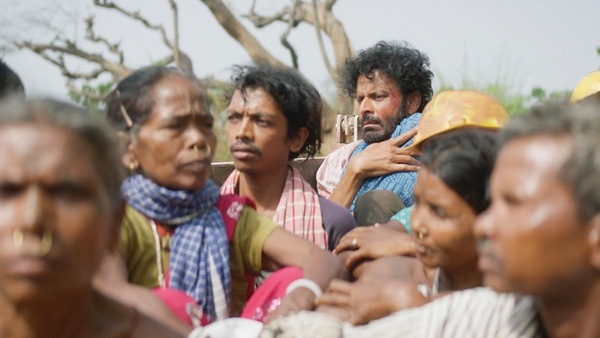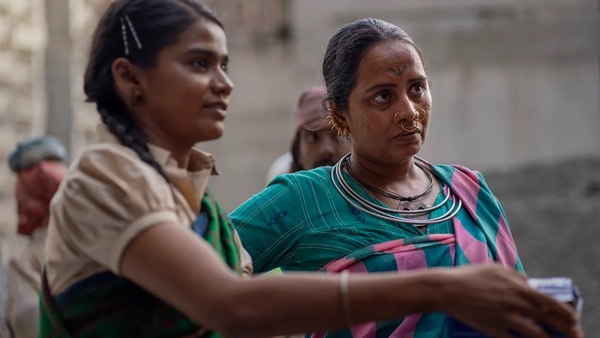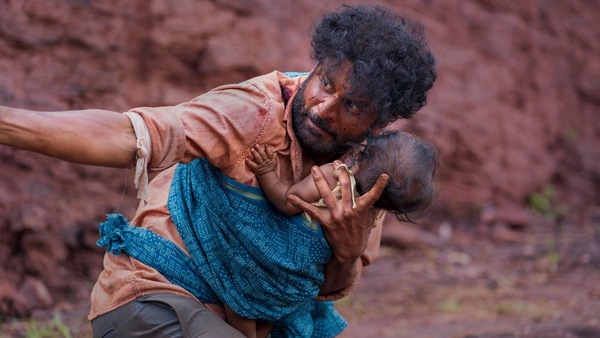Joram Review: A Politically Charged Work With Fascinating Performances
Joram is a social tragedy masquerading as a manhunt.

Last Updated: 07.02 PM, Dec 09, 2023
IN Devashish Makhija’s Joram, his fourth feature and most accessible work so far, the theme and the critique are designed alike. The film is a social tragedy masquerading as a survival thriller. And it unfolds as a clear-eyed commentary on the system that camouflages its devouring instinct as progress. It is a story of the many India(s) that reside in one India and, during its runtime, insists that the parts are stitched and not attached together. The lines of togetherness, are in fact, signs of fracture borne out of decades-long struggle.
Dasru (Manoj Bajpayee) and his wife Vaano (Tannishtha Chatterjee) are construction workers in Mumbai. They are migrants in the urban jungle which has room for all but space for some. Thus, they are reduced to their labour and clubbed in a colorless, numberless building with others like them. Soon, the place will be revamped and handed over to others. Dasru and Vaano are Adivasis from Jharkhand, reduced to a placeholder in the city. They are invisible to the rest but not to all.
Phulo Karma (a terrific Smita Tambe) is an Adivasi woman and ruling party’s MLA. Five years ago, her son was flogged to death when he tried to broker deals with the fellow Adivasis, on behalf of the government, to give up their land. Her husband died soon after, deepening her grief — which she channelled as revenge. Amidst the bloodshed, Dasru and his wife fled but they could only run so far. Phulo found them soon, killed Vaano and staged it as Dasru’s doing. With an infant wrapped around his body, a man is on the run.

None of this counts as a spoiler. Makhija is not telling a whodunit story. It is fairly evident from the beginning that Phulo is the one pulling the strings. She has framed Dasru for murder, leaked the news to a journalist along with footage of his past as a rebel, to pressurise the cops to take action. Joram uses this as a framework to make space for the chase that occupies most of the film. The cops from Mumbai are after Dasru to arrest him, and cops from Jharkhand — by Phulo’s orders — are out to kill him. The kinetic pacing of Joram mimics the hapless existence of the oppressed which is defined by the many ways they evade being hunted. The hunter is ever-present but impossible to pin down. The film unfolds attuned to this fact. Thus, we see Phulo’s face and not the politician she tries talking to. On losing her son, she unleashes her wrath on others like her in a language she has imbibed and not inherited.
In Makhija’s film, the encroaching system is present as an all-encompassing entity. It is wide but never vague. The presence is felt though its absence. Take for instance that scene when Dasru is escaping to his village in Jharkhand and on the truck he finds a group of people talking amongst themselves. One of them asks the other if they have sold their buffalo and for how much. Some of them have become daily laborers. When Dasru inquired after their farming, they said their land sprouts iron now. To them progress is an empty idea, a packaged ideal that translates to nothing. The film reiterates this by naming the steel company that has usurped their land as “pragati” (meaning progress).

There is little that is held back. The film mentions ‘Operation Green Hunt’, a term co-opted by the media to refer to the state forces aimed at eliminating Naxalites from Jharkhand and other states. In a sobering moment, a man says that no one picks up guns by choice: one uniform justifies bullets and the other doesn’t. It is a sparse scene, like most in the film, that stings for being this unembellished.
At its core, Joram is a bold examination of the cost of development and the casualty of it. It is a portrayal of what happens when an entire system is crafted to subjugate the subjugated: they turn against each other. There is Phulo after Dasru. There is also a police officer from Mumbai, Ratnakar Bagul (Mohammed Zeeshan Ayyub), who is given the task to nab Dasru. The cop arrives at Jharkhand and is taken aback with the changes. There is no phone network, minors are put in jail, a young male officer dresses up as a woman for the entertainment of his superiors. On his way to the village, he sees a group of Adivasis pledging to not give up their land. “Our proof is not in the papers, it is in our palms,” they say.

But if the film never becomes an Article 15, Anubhav Sinha’s 2019 upper-caste saviour drama, and Ratnakar never becomes one of the many Ayushmann Khurrana’s characters, an almost always privileged man whose transformation is triggered by witnessing deprivation, it is because Makhijia is too clued into the proceedings of the country to envision such wishful thinking. Ratnakar is a Dalit. He knows what it feels like to be a minority in a country that refuses to acknowledge them.
Ayyub is tremendous as Ratnakar, a man whose work posits him a new setting that is alien but not unfamiliar to him. The actor has such a self-righteous face that a lot is achieved with nothing. There is a scene when he picks up his concerned wife’s call (Rajshri Deshpande makes a brief appearance) and tells her that the man he is chasing has a three-month infant with him. It is a brief moment but it says everything about their broken marriage. Bajpayee is equally riveting. His role hardly has any lines but he inhabits it with his body, crouching like he knows too well that to live he has to hide.
In a more generic sense, the name ‘Joram’ means a gift from God. Biblically, it denotes someone who is elevated. Makhija takes this and roots it in a country where elevation is achieved by persecution. In such a case, the meaning of the word transforms and Joram, the name of the baby in the film, becomes the one who survives.

 Premium
Premium